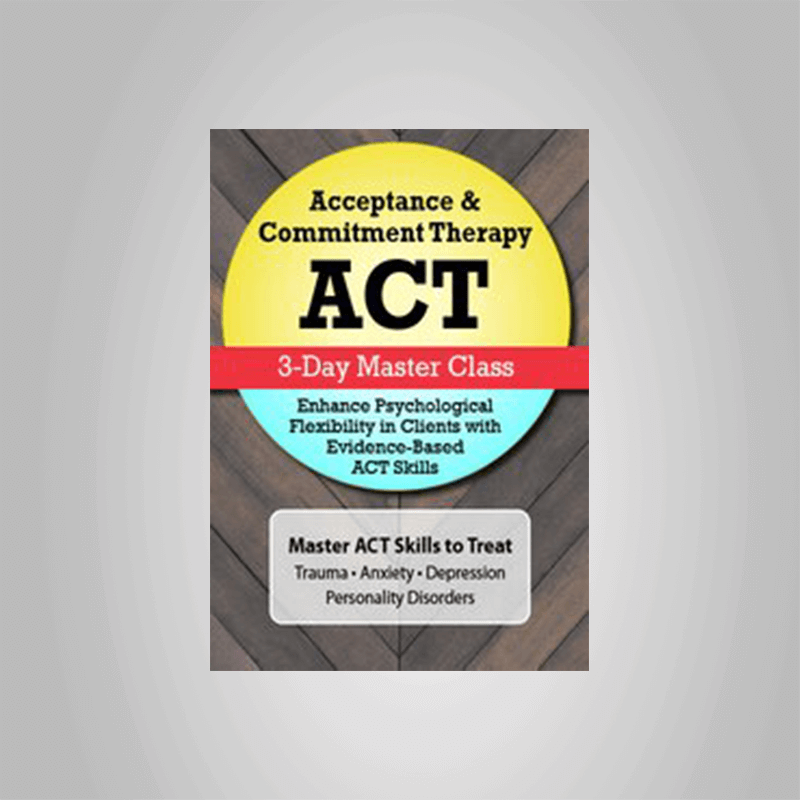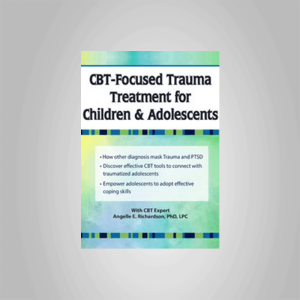Jennifer L. Patterson – Acceptance & Commitment Therapy (ACT) Master Class: Enhance Psychological Flexibility in Clients with Acceptance & Commitment Therapy (ACT)DescriptionWatch this breakthrough Acceptance and Commitment Therapy (ACT) master class to develop core competencies and transform your skills to achieve better therapeutic outcomes, even with your most challenging clients!You’ll learn how ACT weaves mindfulness strategies with cognitive-behavioral change strategies to revolutionize some of the toughest clinical conditions.This in-depth training includes step-by-step methods to:set an ACT consistent treatment planbuild an ACT skills repertoire to use immediately with any clientapply evidence-based ACT practices in a fluid and ongoing mannerClinicians, like you, are experiencing improved outcomes for a wide range of clinical conditions including anxiety, depression, trauma, PTSD, and personality disorders.Full of thought provoking lecture, engaging case studies and guided instruction, you will learn essential ACT skills that your clinical practice is missing to help your clients move forward in living a meaningful life. Leave this master class armed with tools you can use in your very next session.Revolutionize your client outcomes with the flexible and fluid ACT approach!HandoutsManual (7.54 MB) 155 Pages Available after PurchaseOutlineMaster the Core Skills and Competencies of ACTThe ACT ModelWhat is Acceptance and Commitment TherapyEvolution of Third Wave Behavioral TherapiesOutcome StudiesFoundations of ACTContextual Behavioral SciencesFunctional ContextualismRelational Frame TheoryHappiness TrapImportance of Understanding for Clinical PracticeCase ConceptualizationExperiential Avoidance as the Core ProblemCreative Hopelessness ExercisesAssessment MeasuresACT Clinical InterviewInflexahex Diagnostic ModelDiagnostic Model: Six Core Processes of Psychological Inflexibility Experiential AvoidanceLack of awarenessUnclear ValuesUnhelpful BehaviorsAttachment to Conceptualized SelfCognitive FusionTreatment Model: Six Core Processes of Psychological FlexibilityAcceptanceMindful Decision MakingValues ClarificationValue-Based BehaviorsUnderstanding Sense of SelfDefusionInterventions and StrategiesEvidence-Based Processes and PracticesMindfulness Action PlanCommitment Plan WorksheetIntegration of Evidence-Based Models CBT, DBT, CFTRole PlayVideosCase PresentationsACT Treatment PlanningSuggestaflex ModelMetaphorsParadoxical ProcessesMindfulness TechniquesSelf-Compassion ExercisesAnd Much More!ACT in ActionTraumaFunction of Trauma SymptomsSpecify Treatment GoalsTarget Self-harm BehaviorsIncrease Psychological SafetyMindfulness ExercisesAnxiety12 Week ProtocolControl as the ProblemMindful Worry SheetFEAR AlgorithmFEEL Exposure WorkPersonality DisordersIncrease Emotional ToleranceValues ClarificationMind vs. ExperienceTarget the Client’s StoryWork with Client AngerRole of Therapist Self-disclosureDepression 12 Week ProtocolReason GivingRuminationStory TellingDamaged Conceptualized SelfBehavioral ActivationACT Extension ModelsGroups & Individuals: The ACT MatrixSimple Format for Groups and IndividualsFive-sense ExperiencesMental ExperiencesToward MovesAway MovesThe Four QuadrantsTrauma Prevention & Treatment: The Crosshairs DiagramAwareness TrainingIdentify Painful Thoughts and FeelingsIdentify Situations as Being Helpful or UnhelpfulLiving Your Values at Work, Home, or in Other Important Areas of LifeAdolescents: The DNA-V ModelFor Adolescents, Parents, TeachersBased on Growth and DevelopmentUnderstand the 3 Processes and 2 Perspectives of ModelAssist Adolescent with Handling Difficult Thoughts, Feelings, and SituationDiscover RoleNoticer RoleAdvisor RoleOutside of Client Session: The Choice Point Model Useful for in-the-moment Integration of CBT and ACTTarget Situation Selection and ModificationValues and Skills SectionModify the Form or Frequency of Inner ExperienceRespond Flexibly to the Situation and the Inner ExperienceHelp the Client Identify and Use StrengthsCouples: The ID Model Assists with Conceptualization and Treatment of Interpersonal Relationship IssuesSelf-dislikeLack of InsightEmotional Avoidance or Attachment to Emotional ExperienceSelf-compassionSelf-awarenessSelf-acceptancePlease Note: PESI is not affiliated or associated with Marsha M. Linehan, PhD, ABPP, or her organizations.FacultyJennifer L. Patterson, Psy.D., LCPCJennifer Patterson, Psy.D., LCPC, has a mission to offer evidencebased psychotherapy to help others live full and abundant lives. She is the founder of JPI Psychological Solutions in Mokena, Illinois and specializes in treating obsessive compulsive behaviors, anxiety and depression. At JPI she uses ACT and other third-wave models to assist clients with increasing quality of life.Dr. Patterson is an ACT trainer and has lead over 500 ACT workshops across the US and internationally. She has served as vice-president of the Chicago Chapter for the Association for Contextual Behavioral Sciences. Dr. Patterson was a featured psychologist on The Learning Channel (TLC) and former co-author for Psychology Today’s blog When More Isn’t Enough.Dr. Patterson received both her master’s and doctoral degrees from the Illinois School of Professional Psychology. She is a formally trained ACT clinician and is very skilled in mindfulbased therapies and empirically-supported treatments.Speaker Disclosures: Financial: Jennifer Patterson has an employment relationship with MidAmerican Psychological Institute. She receives a speaking honorarium from PESI, Inc.Non-financial: Jennifer Patterson is a member of the American Psychological Association; and Illinois Psychological Association
Jennifer L. Patterson – Acceptance & Commitment Therapy (ACT) Master Class: Enhance Psychological Flexibility in Clients with Acceptance & Commitment Therapy (ACT)
₹14,774.00








